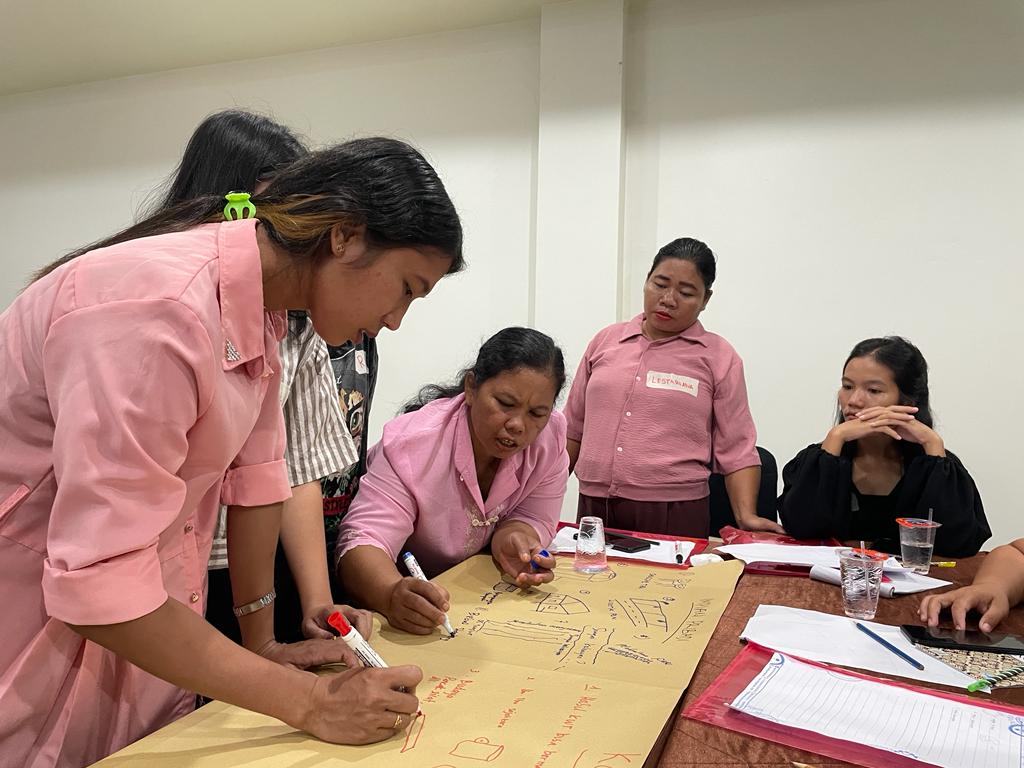On 25-27 September 2023, the Betang Borneo Indonesia Foundation (YBBI) carried out a training activity entitled "Participatory Preparation of Village Regulations (Perdes) using the GEDSI (Gender, Disability, and Social Inclusion) Approach" at the Fiz Hotel, Palangka Raya City. This training involved various parties such as the Village Consultative Body (BPD), Village Government (Pemdes), Women Farmers Group (KWT), as well as community representatives from Pilang Village and Simpur Village.
In her speech, Sevana Dewi, as YBBI Program Manager, emphasized that this training aims to increase the capacity of village governments, indigenous communities, women and marginalized groups in formulating inclusive policies, especially Village Regulations. "It is hoped that this training can increase the knowledge and skills of village officials and the community in preparing Draft Village Regulations, as well as share experiences regarding the mechanisms and techniques for drafting village regulations using the GEDSI approach," he said.
Sevana also added that participatory community involvement in the policy determination process is very important to create an inclusive village. Afandy, Director of YBBI, in his speech also expressed his hope that this training could improve participants' abilities in identifying and inventorying activities that are in accordance with village authority as well as understanding strategic matters that must be discussed and agreed upon at Village Deliberations. According to him, knowledge about inclusion is very important for policy makers at the village level to support a just and equitable development process.
One of the main focuses of this training is increasing the role of women in various aspects of village life. Women, as important subjects in social life, often face challenges in balancing domestic and public roles. This training provides space for women to develop themselves, manage organizations, and learn to become leaders.
This training also aims to strengthen women's leadership capacity by increasing their knowledge, understanding, skills and awareness in running GEDSI-based organizations and advocacy. It is hoped that through this training, women can manage organizations more effectively, appear confident in public, and have high gender awareness.
For three days, training participants received material on how the process of drafting village regulations involves active community participation, including marginalized groups and women, introducing and applying the principles of Gender, Disability, and Social Inclusion in each stage of drafting Village Regulations.
Then, there are effective management techniques for women's groups in managing organizations in villages. Development of leadership skills to eliminate feelings of inferiority and increase women's self-confidence in public, and build awareness about the importance of gender sensitivity in leadership and village development.
This training uses a participatory method, where participants are invited to actively discuss, share experiences, and carry out direct practice in drafting village regulations. In this way, participants not only gain theory, but also practical skills that can be applied in their respective villages.
At the end of the training, participants are expected to be able to draft village regulations that are inclusive and participatory, identify activities that are in accordance with village authority, increase the participation of women and marginalized groups in the decision-making process in the village, and manage village organizations with a GEDSI perspective.
Afandy closed the training by stating that the knowledge and skills obtained during this training were very important to support inclusive and sustainable village development. He also hopes that this kind of training can continue to be carried out to empower more village communities throughout Indonesia.
With this training, it is hoped that villages in Palangka Raya can become examples of how inclusive policies can be implemented effectively, provide real benefits for all levels of society, and encourage the creation of just and prosperous villages.


